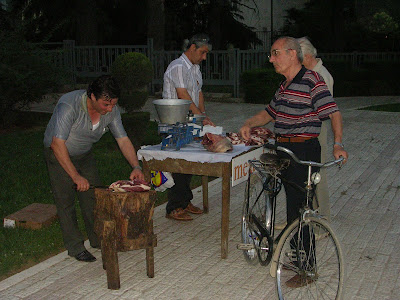

National Gallery of Art, Tirana Albania
The work of Alban Muja, entitled “meat shop”, start from a displacement of the context of a daily action like to go to buy meat. The action consists in fact in inviting a butcher to move his activity on the sidewalk in front of the National Gallery. This kind of action show how the artist see the society, “another" look outside the same social system and for this reason deep and careful in catching those small particular that, emphasized, transform one small situation in the manifestation of a global problem. Muja places this accent in almost all his artistic production like in "Museum of Contemporary History" where a simple landscape photography becomes, with the intervention of the artist, a document on present and past history of Kosovo, or like in "Free your mind" where pronouncing all the names of the personages of the art world that he remembers, he constructs a bridge between his memory, his informations and all the things that the artistic “power" promotes and recognizes like art.
In meat shop, the work thought purposely for 1/60insurgent space, the artist elevates to art work a moment of every day life (buying meat), involving the artistic institution (the National Gallery) and the political power. The happening will be, in fact, three days before the political elections that, like in the best (or the worse one) tradition, construct a facade useful in order to demonstrate all the good things that were made or are being made, in order to convince people not to interrupt this process. Alban Muja shows the hidden facade, that no one wants to show, the died meat, ready to being consumed, but first of all, the common action of a common person, that kind of person of which all speaks about but nobody really cares about them, except at the moment of the vote. Instead, the Alban Muja’s art bring in foreground, just this common and "poor" moment giving it a very important place in the cultural life, elevating it to global problem.
Stefano Romano

No comments:
Post a Comment